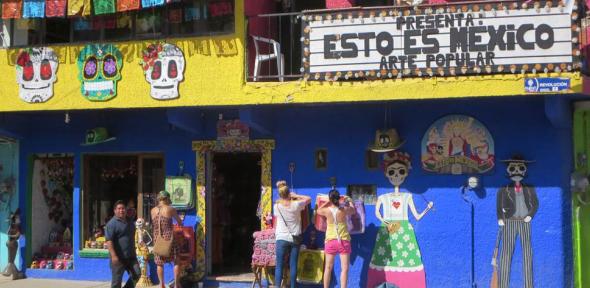
With the colonization of what we know now as the Americas there emerged categories that previously did not exist. Although there was not yet a discourse structured in terms of the existence of biological races, categories of what it means to be human were re-defined and ideas of superiority and inferiority were imposed that previously did not exist, but that still persist today in Mexico. For example, it was during the colony that the notion of mestizo arose, a concept that alluded to diverse social statuses, according to how much indigenous or Spanish ancestry a particular mestizo was thought to have. For example, Spanish mestizos had more possibilities of "whitening", achieving upward class mobility and even being considered like Spaniards. On the other hand, black populations and their descendants had much less favourable options, despite being demographically significant in some urban areas (for example in 1790 in the city of Guadalajara, where Creole elites had displaced the indigenous population, mulatos were 50% of the total population). At present, there are 1,386,000 Afromexicans, who are scattered throughout the country, with a significant presence in states such as Guerrero, Oaxaca and Veracruz.
Although practices of racism in Mexico cannot be understood without taking into account the colonial past, the ideology of the mestizaje that emerged in the post-revolutionary period has also had a significant influence. This ideology was a racial, economic and political strategy to generate a whiter nation. The indigenous population had to stop being “Indians” and the rest of the country's people were supposed to try to whiten themselves and their descendants. It should also be noted that it was from the 1930s that the concept of race was eliminated in the Mexicna census, and instead language was used as a way of identifying indigneous people. As a consequence, it was asserted that racism no longer existed and that what had to be addressed was a problem of class. In 1991, Mexico signed ILO Convention 169, leading in 1992 to Article 4 of the Mexican Constitution being amended to recognize that Mexico was a multicultural country. However the same time, one of the key bastions supporting the reproduction of indigenous communities, Article 27 of the Constitution, was also amended, removing the threefold rights of indigenous territories to be immune from seizure, inalienable and indivisible.
Today, anti-racist practice in Mexico is not a strategy that runs in a single direction. It must be understood, on the one hand, through indigenous resistance and opposition to civilizational and development projects, evident in the conservation of native languages, in the creation of their own epistemological matrices or in autonomous projects; and on the other hand, through the exploration of the experience of being Afro-indigenous as expressed in cultural and artistic projects undertaken by negro, moreno (brown) and Afrodescendent people.
In parallel, a small sector of the academy in Mexico has also enriched antiracist practice. By means of support for various social movements and with an analysis of the logics of the Mexican state, attempts have been made by academics to generate a grammar of anti-racism and a more politicized discourse about "race." Any anti-racist strategy today needs to recognize that it was the Zapatista indigenous movement that, in 1994, brought the discussion of racism into the public sphere. This allows us to understand, for example, the anti-racist leadership that emerged in the academy in the 1990s and which today is a fundamental reference for understanding the discussion of racism in Mexico, as well as the multicultural and intercultural policies of the early 1990s. Through rigorous analysis of specific cases, LAPORA seeks to trace the actions of recent decades through analytical frameworks such as social movements, cultural production and legislation.
